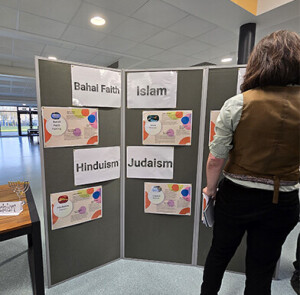Religious Studies

CURRICULUM ETHOS
The ethos of the Religious Studies (RS) curriculum at Eastbrook School is rooted in promoting understanding, respect, and critical engagement with diverse worldviews.
RS explores both religious and non-religious worldviews, helping students understand beliefs such as Christianity, Islam, Hinduism, Buddhism, Judaism, Sikhism and Humanism. The curriculum supports students’ spiritual, moral, social, and cultural growth, encouraging reflection on their own beliefs and values. Pupils are taught to analyse religious texts, ethical dilemmas, and philosophical questions, fostering respectful debate and independent thought. RS plays a role in promoting mutual understanding and tolerance in a pluralistic society, contributing to peaceful coexistence.
The Religious Studies Curriculum in Summary
Throughout KS3, RS lessons are structured explorations of religious and non-religious constructivist model of learning. Students begin with an ‘introductory unit’ which is related to the local religious traditions, in a thorough investigation of the Christian tradition. KS3 RS also engages students in an exploration of philosophical, theological and ethical issues through exploration of six key themes: ideas about humanity; ideas about God; ideas about sacred time and space; ideas about journeying; ideas about religion in the modern world; ideas about making moral decisions. These are viewed through the prism of secular/non-religious world views (e.g. atheist, humanist) and other religious tradition.
At GCSE, students are offered the opportunity to undertake Religious Studies. Year 10 begin their study with Islam beliefs and then a theme which is Issues of Life and Death and then moving onto Christian beliefs. This is part of Eduqas exam syllabus and prior understanding of religion, beliefs which is further developed along with student’s own views and religious beliefs. This allows students to develop understanding in major views and teachings in two major religions. Throughout both themes, the nature of God and the 4 Omnis are explored in relations to human behaviour. Conflicting sources are further used to develop students’ skills in comparing and contrasting religious theology around topics explored throughout the themes. This feeds into the study of Issues of Relationships and Islam practices which they can start embedding religious ideologies to these themes and their views. Across the themes and religion is the overarching concept of the role of women and men. This is explored through Genesis and the concept of families as well as the purpose of life for humans. The Sanctity of Life is brought into question when challenging God’s omnipotence, omnibenevolence, omnipresence and omniscience.
The curriculum sequence continues in Year 11 with the study of Christian Practices and other themes, due to the Book of Moses and chronology of religion, the study of Christianity continues into Year 11 autumn term. This allows both the Old Testament (Book of Moses) and the New Testament to be studied with the biblical references and sources of authority embedded into the vocabulary and knowledge of our students. Using prior knowledge from the religions studied, students will further enhance their understanding and comprehension of the religious views for each topic. The exam practices will further help guide intervention towards students who are targeted as below progress.
An All-Through Curriculum
The Religious Studies curriculum provides a continuous and coherent educational journey from early years through to post-16 education. At its core, RS is designed to develop students’ understanding of religious beliefs, practices, and worldviews in a way that deepens and matures as they progress through school. In the early stages, such as Key Stage 1 and 2, children are introduced to the basic tenets of major world religions, including stories, festivals, and symbols that help them understand the role of religion in people’s lives. This foundational knowledge is built upon in Key Stage 3, where students begin to explore more complex ideas such as religious ethics, philosophical questions, and the impact of religion on society and culture. By Key Stage 4 and 5, RS becomes more analytical and evaluative, encouraging students to critically examine religious and secular perspectives, engage in debates, and reflect on moral and existential issues.
Throughout this progression, RS supports the development of key skills such as empathy, critical thinking, and respectful dialogue. It also contributes significantly to students’ spiritual, moral, social, and cultural (SMSC) development, helping them to understand diversity, identity, and global citizenship. The curriculum is often structured around recurring themes—such as justice, suffering, and the nature of belief—which are revisited with increasing depth and complexity. This thematic continuity ensures that RS is not just a series of disconnected lessons, but a rich, evolving exploration of human values and worldviews. Moreover, RS often intersects with other subjects like history, literature, and citizenship, reinforcing its relevance and helping students make connections across the curriculum. In this way, RS exemplifies the principles of an all-through curriculum: consistent, developmental, and deeply integrated into the broader educational experience.
Diversity and Inclusion in the Religious Studies Curriculum
Religious Studies demonstrates diversity and inclusion in the curriculum by actively engaging students with a wide range of religious and non-religious worldviews, fostering respect, understanding, and empathy for different beliefs and cultures. From the early years through to secondary education, RS introduces students to the beliefs, practices, and traditions of major world religions such as Christianity, Islam, Hinduism, Sikhism, Buddhism, and Judaism, as well as non-religious perspectives like Humanism and atheism. This broad coverage ensures that students are not only learning about the dominant faiths in their local context but also about global belief systems, promoting a more inclusive worldview.
The curriculum is designed to reflect the pluralistic nature of modern society, encouraging students to appreciate the richness of cultural and religious diversity. Lessons often include discussions on how different communities celebrate festivals, approach moral dilemmas, and express their spirituality, helping students to see the value in different ways of life. RS also supports inclusion by creating a safe space for students to express their own beliefs and identities, whether religious or secular, without fear of judgment. It promotes critical thinking and respectful dialogue, allowing students to explore controversial issues such as gender roles, equality, and social justice through the lens of various belief systems.
Moreover, RS contributes to the wider school ethos of inclusion by aligning with values such as tolerance, mutual respect, and human rights. It helps challenge stereotypes and prejudices, encouraging students to think beyond simplistic or biased representations of religion. By embedding these principles throughout the curriculum, RS plays a vital role in preparing students to live and thrive in a diverse and interconnected world.
Cultural Capital and Enrichment in the Religious Studies Curriculum
Religious studies demonstrates cultural capital and enrichment by immersing students in the rich tapestry of global beliefs, traditions, and philosophies that have shaped human history. Through the exploration of sacred texts, rituals, and ethical teachings from diverse religions and worldviews, students gain access to profound cultural knowledge and moral reasoning that enhances their understanding of society and identity. This subject fosters critical thinking, empathy, and intercultural awareness—skills that are highly valued in both academic and civic life. Enrichment is further supported through experiential learning, such as visits to places of worship, interfaith dialogues, and engagement with contemporary issues like social justice and human rights. By connecting students to the intellectual and spiritual heritage of humanity, religious studies cultivates a deep sense of cultural literacy and personal growth.
Literacy and Oracy in the Religious Studies Curriculum
Religious Studies supports literacy and oracy by engaging students in the interpretation of sacred texts, philosophical writings, and contemporary commentaries, which enhances their reading comprehension, vocabulary, and analytical writing skills. Through structured discussions, debates, and dialogic teaching, students develop oracy by learning to express complex ideas clearly, listen actively, and engage respectfully with differing viewpoints. The subject encourages the use of subject-specific language and promotes exploratory talk, helping learners articulate their understanding of belief systems, ethics, and identity. These practices not only strengthen communication skills but also prepare students for thoughtful participation in academic, social life.
We strongly encourage students to participate fully in all aspects of our curriculum, including Religious Studies and PSHE. However, parents and carers have the right to withdraw students from aspects of the Religious Studies and PSHE curriculum. This is a process that is carefully managed by the school and we work actively to encourage parents and carers to engage with the support, training and information that we offer, to ensure that students get the fullest experience possible. If a parent or carer does wish to discuss this, or remove a student, they should contact the academic deputy Mr Hewitt by email: hewittn@eastbrookschool.org.

